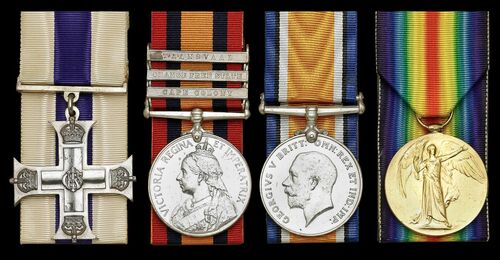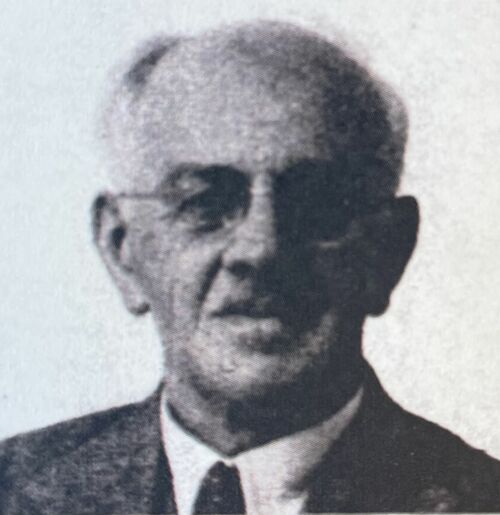Auction: 23113 - Orders, Decorations and Medals - e-Auction
Lot: 574
The Great War M.C. group of four awarded to Major M. T. Ascough, Royal Army Medical Corps, who was taken a Prisoner of War on the First Day of the German Spring Offensive and latterly assisted in the North Russia operations
Military Cross, G.V.R.; Queen's South Africa 1899-1902, 3 clasps, Cape Colony, Orange Free State, Transvaal (15342 Pte. M. T. Ascough. R.A.M.C.); British War and Victory Medals (Major M. T. Ascough.), good very fine (4)
M.C. London Gazette 23 April 1918:
'For conspicuous gallantry and devotion to duty in dressing wounded in the open for forty-eight hours, without sleep or rest, under heavy shell fire, after his shelter had been rendered untenable by four direct hits.'
Matthew Thomas Ascough was born in 1877 at St Thomas', Hyde, Cheshire and was educated at Gildersome College, Yorkshire and Manchester University. Joining the Manchester Company, Volunteer Medical Staff Corps, he joined the Royal Army Medical Corps on 27 March 1901 and embarked for South Africa on 16 April 1901. Returned home on 19 August 1902, by 1909 he went into general practice at Romiley, Cheshire.
With the outbreak of the Great War, he joined was appointed to the 1st North Midland Field Ambulance as a Lieutenant in October 1914 and eventually proceeded to France in February 1917 when the 2/1st North Midland Field Ambulance entrained at Semley Station.
Having firstly been put forward for the M.C. by Lieutenant-Colonel Dawson in September 1917, he earned his immediate M.C. for gallantry on 24-27 September at Bearer Relay Post, East of Ypres for assisting the wounded without rest for some three days under heavy fire.
Ascough was to be taken a Prisoner of War on the First Day of the German Spring Offensive, 21 March 1918, when captured at the ADS Brewery, Escourt near Arras. He was confirmed in the rank of Major whilst commanding Sections of the Field Ambulance and was eventually repatriated by October 1918.
Never far from the action, he went aboard the Braemar Castle to Murmansk, in order to treat and bring back the wounded from the North Russian campaign (South African Medical Journal, refers).
Returned home, he was again called into action during the Second World War and was Medical Officer in Command of a Mobile First Aid Unit. Having retired in 1949, he settled with his wife and family in King William's Town, where they opened up a General Practice, with both his wife and son having qualified. District Surgeon at that place on several occasions, Ascough died on 8 August 1952; sold together with copied research.
Subject to 20% VAT on Buyer’s Premium. For more information please view Terms and Conditions for Buyers.
Sold for
£1,100
Starting price
£700







